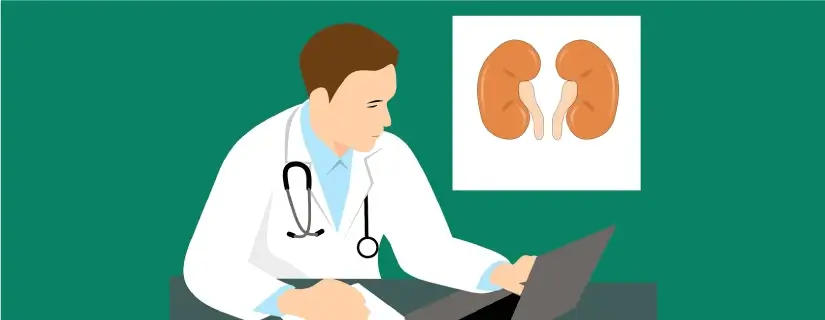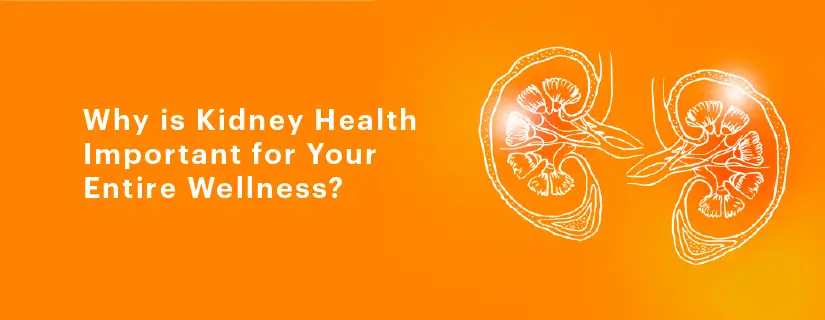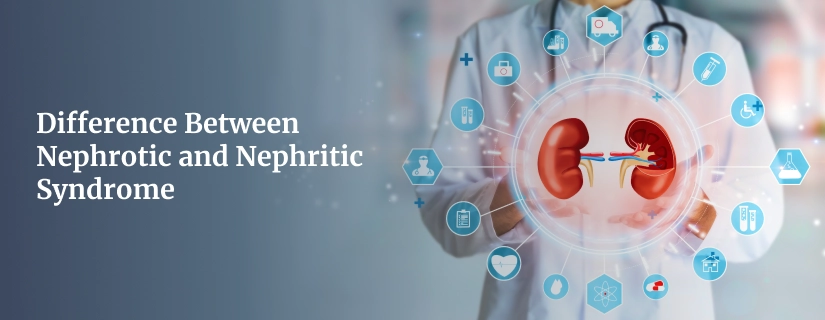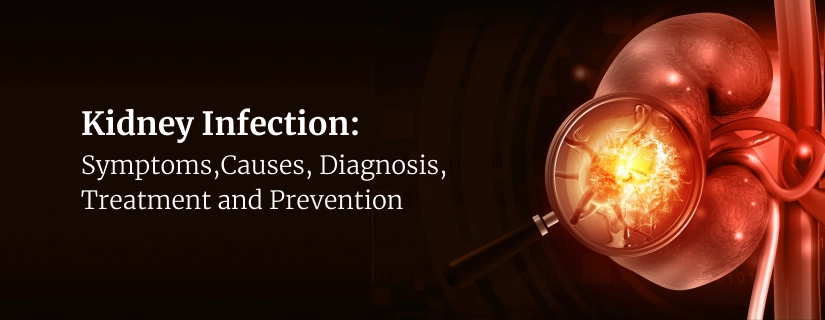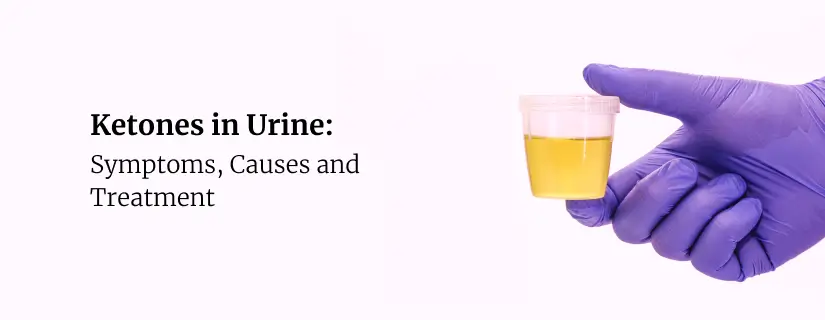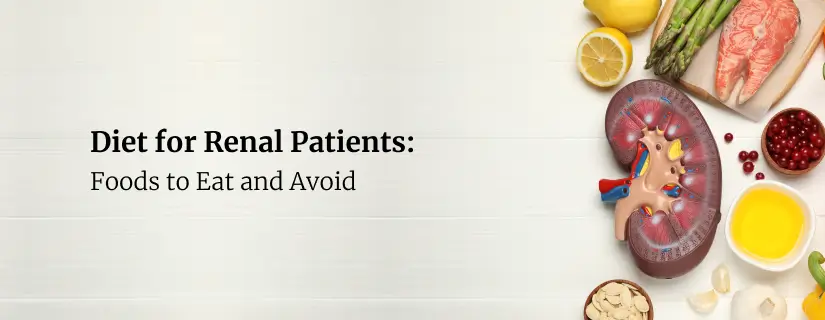-
Doctors
-
Specialities & Treatments
Centre of Excellence
Specialties
Treatments and Procedures
Hospitals & Directions HyderabadCARE Hospitals, Banjara Hills CARE Outpatient Centre, Banjara Hills CARE Hospitals, HITEC City CARE Hospitals, Nampally Gurunanak CARE Hospitals, Musheerabad CARE Hospitals Outpatient Centre, HITEC City CARE Hospitals, Malakpet
HyderabadCARE Hospitals, Banjara Hills CARE Outpatient Centre, Banjara Hills CARE Hospitals, HITEC City CARE Hospitals, Nampally Gurunanak CARE Hospitals, Musheerabad CARE Hospitals Outpatient Centre, HITEC City CARE Hospitals, Malakpet Raipur
Raipur
 Bhubaneswar
Bhubaneswar Visakhapatnam
Visakhapatnam
 Nagpur
Nagpur
 Indore
Indore
 Chh. Sambhajinagar
Chh. SambhajinagarClinics & Medical Centers
Book an AppointmentContact Us
Online Lab Reports
Book an Appointment
Consult Super-Specialist Doctors at CARE Hospitals
8 Ways to Keep Your Kidneys Healthy
Updated on 10 April 2022
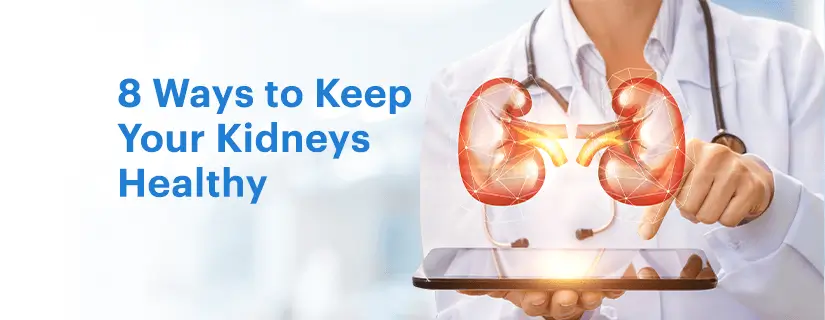
The kidneys are located at the bottom of your rib cage, on either side of your spine. Their function is multifaceted.
The most significant function of kidneys is to filter waste products, surplus water, and other impurities. Excess water from your body gets stored in your bladder and eventually removed.
Your kidneys also control pH and salt levels in your body. The production of red blood cells and the regulation of blood pressure are also managed by hormones secreted by the kidneys.
As well as activating a form of vitamin D to aid in bone building and muscle contraction, your kidneys are also responsible for regulating your body’s calcium absorption.
Your overall health and well-being depend on the health of your kidneys. Having healthy kidneys will result in the proper filtration and elimination of waste as well as the production of hormones that your body needs to function.
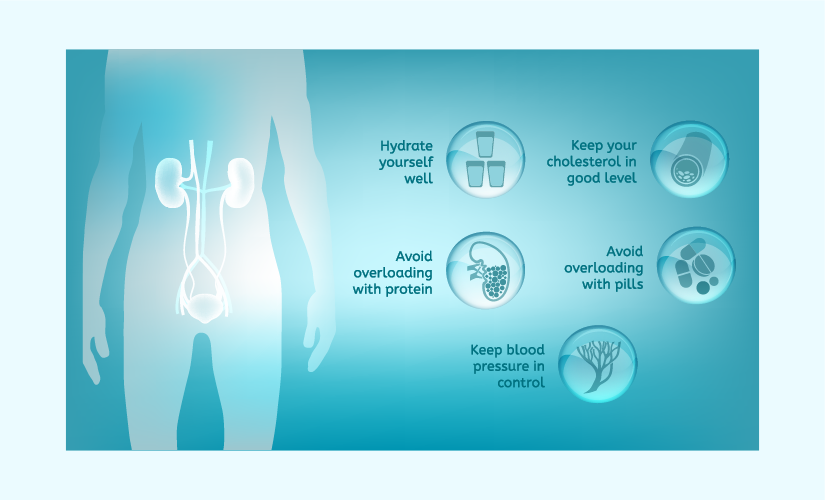
Types of Kidney Disease
- Chronic Kidney Disease (CKD): CKD is a progressive condition characterized by the gradual loss of kidney function over time. It is often caused by underlying conditions such as diabetes, high blood pressure, or kidney infections.
- Acute Kidney Injury (AKI): AKI occurs suddenly and is often reversible with prompt medical intervention. It can be caused by severe infections, medications, dehydration, or kidney blockage.
- Polycystic Kidney Disease (PKD): PKD is an inherited condition in which numerous cysts form in the kidneys, causing them to enlarge and lose function gradually.
- Kidney Stones: Kidney stones are hard deposits that form in the kidneys. They can cause severe pain and may result from factors like dehydration, certain medications, or a high-sodium diet.
8 Ways to Keep Your Kidney Healthy
Here are some tips for kidney health:
1. Maintain A Healthy Lifestyle
Exercising regularly has many benefits besides reducing your waistline. Chronic kidney disease can be prevented by exercising regularly. As a result, it lowers blood pressure and helps boost heart health, which is important for preventing kidney damage.
A healthy lifestyle doesn’t require running marathons. It’s perfectly fine to walk, run, cycle, and even dance for your health. Choose an activity you enjoy and will keep you busy. This will help you stick with it and achieve great results, and maintain kidney health.
2. Maintain Healthy Blood Sugar Levels
If you suffer from diabetes, or a condition that leads to high blood sugar, you may suffer kidney damage. As a result, your kidneys work harder to filter your blood when you cannot use the glucose (sugar) in your blood. This can have life-threatening results after years of exertion.
If you manage your blood sugar, you can reduce the risk of damage. Furthermore, the earlier the damage is detected, the more likely it is that the damage will be reduced or prevented.
3. Monitor Your Blood Pressure
High blood pressure can result in kidney damage. The impacts on your body can be significant if high blood pressure occurs in conjunction with other health issues like diabetes, heart disease, or high cholesterol.
A healthy reading of blood pressure is 120/80. Your lifestyle and diet may play a role in lowering your blood pressure.
A blood pressure reading consistently exceeding 140/90 may indicate high blood pressure. Your doctor may prescribe medication, or you may need to change your lifestyle and monitor your blood pressure regularly.
4. Maintain a Healthy Diet and Weight
An overweight or obese person is at risk of kidney damage as well as other health problems. Diabetic complications, heart disease, and chronic kidney disease are all possible.
It is possible to reduce the risk of kidney damage by eating a diet low in sodium, potassium phosphorus and avoiding other kidney-damaging foods. During the week, consume fresh, naturally low-sodium ingredients such as cauliflower, blueberries, fish, and whole grains.
5. Stay Hydrated by Drinking Plenty of Fluids
Although it’s not a secret that we should drink eight glasses of water a day to stay hydrated, it is a good goal, because it encourages us to stay hydrated. Your kidneys benefit from regular, consistent water consumption.
Your kidneys are cleansed with water by removing sodium and toxins. In addition, you are less likely to develop chronic kidney disease if you drink water regularly.
You should drink at least 1.5 to 2 liters of water each day. Depending on your health and lifestyle, you need a different amount of water. When planning your daily water intake, you should consider climate, exercise, gender, health status, and whether or not you are pregnant or breastfeeding.
Drinking more water will prevent kidney stones in the future for those who have already had them.
6. Avoid Smoking
The blood vessels in your body are damaged by smoking. The result is reduced blood flow throughout your body, especially to your kidneys.
You are also more likely to develop kidney cancer if you smoke. Quitting smoking will decrease your risk. Nonetheless, it will take a long time for your risk level to return to that of someone who had never smoked.
7. Make Sure You Don’t Take Too Many OTC Pills
You could have kidney damage if you regularly take over-the-counter (OTC) pain medication. In the case of chronic pain, headaches, or arthritis, taking NSAIDs regularly can cause damage to the kidneys, including ibuprofen and naproxen.
Patients without kidney problems who occasionally take the medicine are probably safe. You could end up endangering your kidneys if you take these medicines every day. If you are living with pain, discuss kidney-safe treatments with your doctor.
8. Consider Having Your Kidney Function Checked If You Are At High Risk
It’s a good idea to get regular kidney function tests if you are at risk for kidney damage or kidney disease. People at risk for kidney damage and kidney disease include:
- Senior Citizen.
- Premature babies.
- Patients with cardiovascular disease or those with a family history of it.
- People with high blood pressure and those who have a family history of it.
- People have Diabetes with uncontrolled blood sugar levels.
- Obese individuals.
- People with a family history of kidney disease.
Checking kidney function on a regular basis is an excellent way to check kidney health and look for changes. Preventing or slowing future damage can be achieved by getting ahead of any problems.
How to Maintain Healthy Kidneys
-
Maintaining healthy kidneys involves staying hydrated, consuming a balanced diet low in salt and processed foods, managing blood pressure and blood sugar levels, engaging in regular physical activity, avoiding excessive use of painkillers, and refraining from smoking.
-
Regular check-ups, managing underlying health conditions, and minimizing alcohol intake also contribute to kidney health.
- Adequate rest, stress management, and avoiding excessive protein intake can further support kidney function.
Foods to Keep Kidneys Healthy
- Berries are rich in antioxidants, berries like strawberries, blueberries, and raspberries can support kidney health.
- Leafy greens vegetables like spinach, and kale, are high in vitamins, minerals, and antioxidants, supporting overall kidney function.
- Fatty fish provide essential omega-3 fatty acids, which have anti-inflammatory properties to benefit kidney health.
- Olive oil contains healthy fats and antioxidants, which may help reduce inflammation and support heart and kidney health.
- Garlic is known for its anti-inflammatory and anti-microbial properties which may help to maintain kidney health.
- Whole grains like brown rice, whole wheat bread, and quinoa provide fibre, nutrients, and antioxidants, good for kidney function.
- Apples are high in fibre and antioxidants.
- Cauliflower is good source of vitamin C, fiber, and compounds that help the kidneys remove waste.
- Red Bell Peppers are rich in vitamins A, C, and B6, as well as antioxidants, to support kidney health.
- Staying hydrated by drinking adequate water throughout the day helps maintain kidney function by supporting proper filtration and waste elimination.
When Kidneys Need Emergency Room Visits
Pediatricians detect most chronic kidney problems or congenital disabilities in children. Adults are more difficult to diagnose. Our bodies often attempt to tell us that kidney distress is a symptom of another issue.
Patients in the emergency room with renal distress are most commonly suffering from kidney stones. A kidney stone is a hard collection of calcium or uric acid plus salt and they can travel to the rest of the urinary tract by the flow of urine.
An abdominal, groin, genital, or side pain caused by kidney stones is severe. The following symptoms may also occur:
- Urine-containing blood
- High fever and chills
- Vomiting or severe nausea
Risk Factors for Kidney Disease
- Diabetes: Elevated blood sugar levels in diabetes can damage the kidney's filtering units over time, leading to kidney disease.
- Hypertension (High Blood Pressure): Uncontrolled high blood pressure strains the blood vessels in the kidneys, impairing their function and increasing the risk of kidney damage.
- Kidney Stones: The formation of kidney stones can obstruct the urinary tract, causing inflammation and potential damage to the kidneys.
- Infections (Urinary Tract or Systemic): Infections can directly affect the kidneys, leading to inflammation and impairing their normal functioning.
- Overweight and Obesity: Excess body weight increases the risk of developing diabetes and hypertension, both of which are major contributors to kidney disease.
- Over-the-Counter Painkiller Use: Frequent or prolonged use of certain painkillers, such as non-steroidal anti-inflammatory drugs (NSAIDs), can harm the kidneys and impair their blood flow.
- Previous Acute Kidney Injury: A history of acute kidney injury, often caused by severe infections, trauma, or medication toxicity, can increase the susceptibility to chronic kidney disease.
- Family History of Kidney Disease: Genetic predisposition plays a role, and a family history of kidney disease can increase the likelihood of developing similar conditions.
- Very Low Birth Weight: Individuals born with very low birth weight may experience underdeveloped kidneys, which could contribute to kidney-related issues later in life.
Preventing Chronic Kidney Failure
Preventing kidney failure involves adopting specific lifestyle adjustments. Here are some key recommendations:
- Alcohol Consumption: For individuals over 65, limiting alcohol intake to one drink per day is advisable. Males under 65 should restrict themselves to two drinks or fewer.
- Blood Pressure Management: Regularly monitor and manage blood pressure to reduce the risk of kidney damage.
- Blood Sugar Control: If you have diabetes, effectively manage blood sugar levels to prevent complications that can lead to kidney issues.
- Weight Management: Maintain a moderate weight by considering calorie reduction and increased physical activity. Consult with a doctor for personalized and healthy weight loss guidelines.
- Caution with OTC Pain Relievers: Be cautious with over-the-counter pain relievers, as they can potentially cause kidney damage. Follow package instructions, take them as needed, and discuss their use with a doctor if you have concerns about kidney health.
- Smoking Cessation: If you smoke, consider quitting to reduce the risk of kidney-related complications.
Conclusion
Maintaining healthy kidneys is crucial for overall well-being and longevity. By adopting these eight key strategies and undergoing regular health check-ups, you can promote optimal kidney health and reduce the risk of kidney diseases. Remember, early detection and prevention are key, so prioritize your kidney health and consult healthcare professionals at CARE Hospitals, we have the best kidney specialist in Hyderabad who offers a comprehensive and multi-disciplinary approach to the treatment of kidney diseases & failures.
To Book an Appointment, call:
ENQUIRY FORM
SELECT CATEGORIES
-
Neurosciences (16)
-
Neurology (37)
-
Neurosurgery (14)
-
Orthopaedics (48)
-
Oncology (33)
-
Obstetrics and gynecology (52)
-
Pulmonology (23)
-
Urology (20)
-
Nephrology (13)
-
Psychiatry (7)
-
Dietetics and Nutrition (111)
-
General Medicine (63)
-
Cardiac Sciences (32)
-
Vascular & Endovascular Surgery and Interventional Radiology (15)
-
Gastroenterology (46)
-
Endocrinology (23)
-
Plastic Surgery (10)
-
Critical Care Medicine (5)
-
COVID-19 (16)
-
Dermatology (16)
-
Emergency Care (1)
-
Ophthalmology (4)
-
Pediatrics (14)
-
Laparoscopic and Bariatric Surgery (8)
-
ENT (15)
-
Kidney Transplant (1)
-
Liver Transplantation and Hepatobiliary Surgery (5)
-
General Surgery (3)
-
Internal Medicine (5)
-
Medicine Information
How does diabetes affect the kidneys?
Diabetes Kidney Failure: Symptoms, Causes and Prevention
YOU MAY ALSO LIKE
RECENT BLOGS
-

Preterm Birth (Premature Birth): Symptoms, Causes, Treatment and Prevention
13 May 2025
Read More
-

Rotablation Angioplasty: Benefits, Treatments, And Recovery Time
9 May 2025
Read More
-

What Is The Difference Between IUI and IVF?
9 May 2025
Read More
-

Venous Malformations: Causes, Symptoms, and Treatment
30 April 2025
Read More
-

Varicose Vein Foam Sclerotherapy: Treatment, Benefits, and Procedure
30 April 2025
Read More
-

Radiofrequency (RF) Ablation Treatment for Varicose Veins: Know More
30 April 2025
Read More
-

Varicose Vein Sclerotherapy: Treatment, Benefits, and Procedure
30 April 2025
Read More
-

Varicose Vein Endovenous Laser Ablation: Procedure, Benefits, Risks
30 April 2025
Read More
Have a Question?
If you cannot find answers to your queries, please fill out the enquiry form or call the number below. We will contact you shortly.





